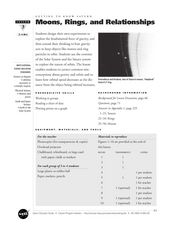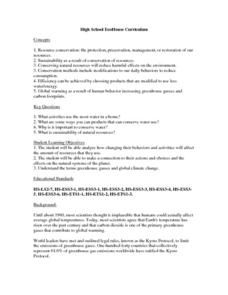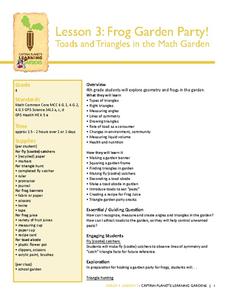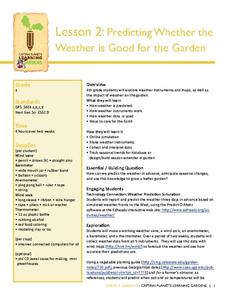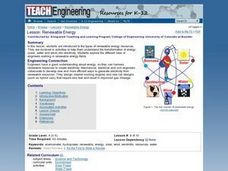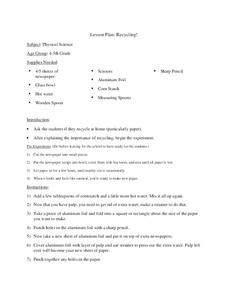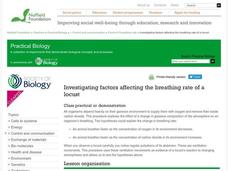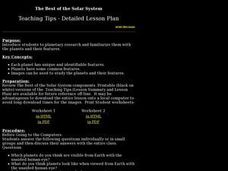Curated OER
Planet Earth: Almost 6 Billion Served
Young scholars investigate the global population explosion, by comparing India's and China's population control efforts and results. They interpret the UN's Human Development Report, and conduct research on another highly-populated country.
Curated OER
Neither Wind Nor Rain
Here is another in the interesting series of lessons that use the special State Quarters as a learning tool. This one uses the North Dakota State Quarter. During this instructional activity, your class learns about the different patterns...
Captain Planet Foundation
Fall into Healthy Shapes
Kindergartners identify geometric shapes by planting a fall garden. They start their seeds in containers that have different shapes, and keep track of their plants based on those shapes. This brilliantly designed and incredibly thorough...
NASA
Biology Training Conclusion
Gravity is just one consideration when determining human habitability on a new planet. The lesson connects four different units and starts with connecting the various systems: planetary systems, human body systems, etc. After scholars...
UNICEF
Get Real on Climate
Climate change isn't just about a warming planet; it will affect humans' health, spread of disease, changes in heat waves and droughts, and changes in storms and wildfires. Participants explore global climate change through discussions...
Captain Planet Foundation
Worm Your Way Out of This
How can you provide healthy soil for your garden? Study worms, bacteria, and other microorganisms in a lesson about decomposition and organic compost. After discussing what you know about worms and watching a video, watch what worms do...
Curated OER
Our Population and Its Impact on the Planet
Students explore environmental problems due to the growing worldwide human population and examine the growth rate. They also discuss possible ways to stabilize population growth and increase sustainable development.
Curated OER
Getting to Know Saturn: Moons, Rings, and Relationships
Students identify the different objects that orbit Saturn. In this space science lesson, students plot the graph of orbital speed and distance. They explain why planets and asteroids remain in orbit around the sun.
Curated OER
NASA Plans Moon Base
Students react to statements about the moon, then read a news article about NASA's plans to build a permanent base on the moon. In this space science and current events lesson, the teacher introduces the article with a discussion and a...
Curated OER
High School EcoHouse Curriculum
How has the level of carbon dioxide changed over recent years, and what is contributing it? Groups work together to research and present their findings in a creative way. Also built into the lesson is a visit to a sustainable house, but...
Captain Planet Foundation
Rotting Away
What happens at the end of a plant's life cycle? Show kids the natural way that plants show that they're decomposing, as well as the importance of compost, with a lesson about living organisms. After reading Log Cabin by Anne Schreiber,...
Captain Planet Foundation
Frog Garden Party! Toads and Triangles in the Math Garden
It's frog party time! With frog banners, frog juice, and a triangle hunt, your garden party is sure to be both entertaining and educational. The lesson connects geometry, earth science, and delicious snacks to teach kids about ecosystems...
Captain Planet Foundation
Help a Sister Out: Garden Companions
Explore Native American gardening traditions with a lesson on companion planting. Based on the concept that certain crops grow better when planted near other specific crops, kids research the gardening method with background links and by...
Captain Planet Foundation
Predicting Whether the Weather is Good for the Garden
Can your class predict the weather? Show them how they can come close with a lesson about creating weather instruments, including weather vanes, barometers, wind socks, anemometers, and thermometers. Kids research weather patterns and...
Curated OER
TE Lesson: Renewable Energy
Students examine renewable energy sources such as solar, water, and wind. They experiment to determine how renewable energy is transformed into electricity. They investigate the role of engineers who work in the field of renewable energy.
Curated OER
Retrograde Motion of Mars
Middle schoolers investigate the motion of Mars. In this space science lesson, students use transparencies to trace the path of Mars through constellations. Middle schoolers discuss the characteristics of the planet.
Curated OER
Measure the Earth's Circumference
Students explore geometry by conducting a science experiment. For this circumference measurement lesson, students review the Greek geographer Eratosthenes who first discovered the circumference of our planet. Students utilize...
University of Colorado
Enceladus, I Barely Knew You
Use spectral knowledge to make discoveries on a distant moon. Small groups gather information from images of one of Saturn's moons. The moon orbits within the E-ring made up of mainly water ice. Using information about the composition of...
Curated OER
Recycling!
Students explore environmental awareness by participating in a recycling activity. In this sustainability lesson, students identify methods in which things can be reused, such as paper. Students utilize aluminum foil, a bowl, water,...
Curated OER
Inside the Crater
Learners explore and analyze what's inside the crater of an active volcano. They research the history of powerful eruptions and how they have helped to make our planet what it is today. Each student then illustrates, designs and...
Space Awareness
Ocean Acidification
Learn the science behind ocean acidification and its effects on ocean wildlife. Young scientists conduct a laboratory investigation that monitors the acidity level of water. While burning a candle, learners capture the carbon dioxide in...
K20 LEARN
Shanking A Shark: Shark Dissection
Sharks are so cool, they have their own week! Take young zoologists on a journey into one of the most amazing creatures on the planet. A lesson plan the from K20 Center engages them in a full dissection. After the lab, participants...
Nuffield Foundation
Investigating Factors Affecting the Breathing Rate of a Locust
Do animals breathe faster when given more oxygen or more carbon dioxide? Young scientists observe the respiration rates of locusts under a variety of gas concentrations to answer that very question. They collect data, analyze the...
Curated OER
Planetary Research (Grades 9-12)
Students are introduced to planetary research and familiarize them with the planets and their features. They see that each planet has unique features. Planets have some common features and that images can be used to study the planets and...
Other popular searches
- Lesson Planet Lo Gin
- My Lesson Planet
- Planet Lesson Plans
- Google Planet Lesson Plans
- Lesson Planet Membership Fee
- Lesson planet.com
- Cost of Lesson Planet
- Lesson Planet Cost
- Creative Lesson Planet Earth
- Planets Lesson Plans
- Lesson Planet Home Page
- Lesson Planets Phone Number









